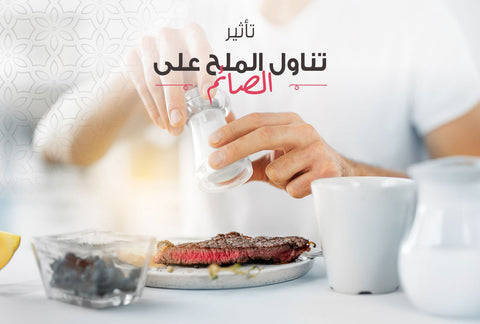There is no doubt that interest in food increases during the month of Ramadan , which makes the mother innovate in preparing delicious foods for her family, and preparing a Ramadan table that whets the appetite. This may increase the salt in food, as salt plays a very important role in all meals, especially since it gives them a delicious taste and benefits for the body, such as improving mood, building body cells, and helping in the absorption of nutrients. However, excessive salt intake, especially during the fasting period, and at the breakfast meal, threatens your health and leads to many dangers.
What are the dangers of eating salt during breakfast ?
increased thirst
Especially in high temperatures and with long hours of fasting, salt causes increased thirst and may also cause dehydration, which makes the fasting person feel exhausted and tired .
high blood pressure
Under normal circumstances, excess salt causes high blood pressure, which exposes the heart and arteries to health problems. Therefore, it is recommended to drink plenty of water to get rid of excess salt. However, with long hours of fasting, it is difficult to drink large quantities of water to get rid of excess salt, which of course increases high blood pressure and the risk of associated health problems .
fluid retention
Consuming too much salt can lead to fluid retention, which can cause swelling in some parts of the body, causing pain and difficulty moving. This can also occur in vital organs such as the lungs or heart, putting a person's life at risk .
Fluid retention can be relieved by taking diuretics and drinking plenty of water. This is also not possible during Ramadan, so you must be mindful of the amount of salt added to your food to ensure the safety of your family members .
Replace salty foods with these foods
To reduce sodium in your diet, it's best to cut down on processed and packaged foods, restaurant foods, pizza, and frozen meals because they contain a lot of sodium .
Replace salty foods with foods that contain potassium, because consuming plenty of potassium completely prevents thirst while you are fasting, while sodium does the exact opposite .
Foods rich in potassium include potatoes, sweet potatoes, spinach, white beans, bananas, pomegranates, oranges, avocados, salmon, and yogurt .
A set of tips that will help reduce salt consumption in food:
- Do not use too much salt in food and use it in moderate quantities .
- Replace salt in some meals with herbs or spices if they go well with them .
- Reducing the consumption of foods rich in salt, such as canned products, pickles, etc.
- Start your breakfast by eating vegetables and fruits, to avoid eating more salty foods .
- Drink plenty of water and other beneficial fluids such as soup, juice, and milk .
- Gradually reduce the amount of salt you use in your food, so that it becomes a habit that will enable you to do without it in your food later .
- Avoid eating cheese more than once a day .
Consumer Awareness Department








Comments (0)
There are no comments for this article. Be the first one to leave a message!